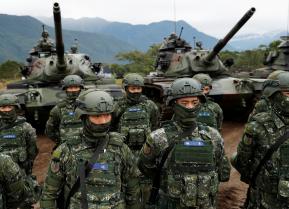Conflict in the Taiwan Strait Is No Mere ‘Family Struggle’—It’s Part of Something Much Greater.
"Whether he likes it or not, Taiwan is in the frontline of an ongoing battle—and it is heating up—to determine the kind of world we and our children will live in for years to come."
Lastly, as he did in his book, Goldstein maintains that the best approach to resolving the Taiwan “issue” would be via “de-escalation spirals.” He rightly points out that a “peace process is, almost by definition, imperfect, as it necessarily involves compromises.” What he does not seem to recognize is the fact that most, if not all, of the necessary compromises would have to be made by the Taiwanese side, chief among them the loss of the de factoindependence they have enjoyed. He then proposes that the “one country, two systems” formula, an “impressively pragmatic framework,” would be the best mechanism by which to achieve some sort of balance. This is where Goldstein enters the realm of fantasy or amnesia—I don’t know which. The Hong Kong experience has made it very clear that the formula was a smokescreen, and that the political system that has existed in the Special Administrative Region is rapidly coming under the control of the central government in Beijing. For a while the world believed that Beijing meant it when it committed to respecting the way of life and system of Hong Kong; in reality, it never masked its real intentions to control it fully, as residents of the SAR are now realizing, what with the threatened ban on “separatist” political parties, the jailing of young pro-democracy activists, loss of control of immigration and a marked erosion of press freedoms, to name just a few of the more salient recent developments. To argue that this formula is “impressively pragmatic” or that it is suited for Taiwan is naive at best, and more likely disingenuous. It rests on a fantasy, on the failed notion that an increasingly paranoid CCP under Xi Jinping would willingly relinquish power and countenance the existence, within the PRC, of a political system at variance with the CCP worldview. That is why the idea of a negotiated settlement, as he proposes, is such a remote possibility: on Taiwan, Beijing will not genuinely negotiate—it would conquer, vanquish, pacify, and then move on.
If the Hong Kong debacle isn’t enough, developments across China, the manner in which dissidents, activists, lawyers, Christians, Buddhists, homosexuals, journalists, academics, Muslims and others have been treated, should be enough to disabuse any Taiwanese of the notion that their way of life under “one country, two systems” would be vouchsafed. Goldstein’s papering over this litany of ills and neglect of the CCP’s terrible track record on human rights is simply astonishing. No party in his right mind would dream of negotiating with a regime that has now proven itself capable of turning an entire region into a virtual (and quite Orwellian) concentration camp, which is what Xinjiang is rapidly turning into, according to several reputable accounts.
I have no doubt that Goldstein is making his case with the United States’ best interests at heart and that he means well. I also have great respect for his accomplishments as an analyst of the Chinese military and have turned to him in the past for insights. Unfortunately, I do not think that the U.S. interest is best served by ignoring, as he does, the true nature of the CCP, or by downplaying the importance of defending allied democracies. Whether he likes it or not, Taiwan is in the frontline of an ongoing battle—and it is heating up—to determine the kind of world we and our children will live in for years to come.
J. Michael Cole is a senior non-resident fellow for the China Policy Institute at the University of Nottingham, UK.
Image: Reuters.


